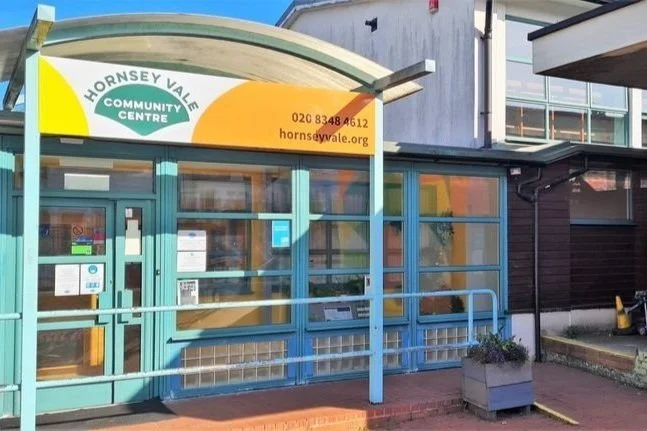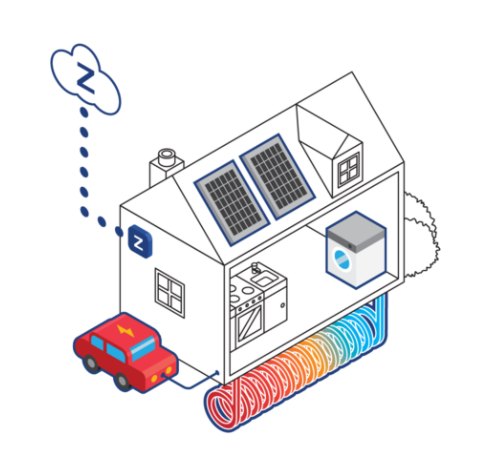Scene conducted technical and financial appraisals for low carbon heating and generation opportunities at Hardwick Estate, South Oxfordshire. The estate is currently transitioning from private ownership to charitable status, representing a unique opportunity to enact community-led energy development. An energy club concept is preferred - combining energy generation and heat solutions to supply estate electrical and heat demand.
Viewing entries in
Local Energy System
Scene contributed energy modelling of a new housing co-operative at Lowfield Green, York, with phase 1 being completed in 2025. Scene contributed to the Community Energy Fund project to calculate the savings and appropriate capacity for a shared photovoltaic generation and battery energy storage system. Scene consulted with the community to assess occupancy and usage patterns before conducting detailed appliance and building thermal modelling used to evaluate different PV and BESS sizing scenarios. The modelling opened up several funding routes with the community progressing the project to the implementation stage.
Funded by the Community Energy Fund, Scene conducted a feasibility assessment investigating the viability of developing low carbon heating and electricity generation in Clanfield, West Oxfordshire. The study comprised detailed technical and financial appraisals, as well as a review of the funding options and legal structures best suited to help the community of Clanfield progress their preferred developments.
Scene undertook a Phase 1 Community Energy Fund study to establish the viability of a communal heat network across five Quaker-owned properties in Yealand Conyers, Lancashire. Due to the site's low energy demand, communal heat systems are not financially viable. A building-specific air-source heat pump alongside a ground solar array solution was recommended.
Scene investigated the options for a low carbon energy system in Crick, West Northamptonshire. This involved detailed technical and financial appraisals across technologies for heat, electricity, and efficiency. Scene recommended a community investment programme in non-domestic rooftop solar, and a supportive programme to increase domestic installation of domestic air source heat pumps, rooftop solar PV, and efficiency upgrades.
Scene led technical and financial appraisals for the development of a low carbon energy solution at Hornsey Community Centre, in North London. Building-specific solutions and local supply opportunities to a neighbouring housing trust and primary school were also considered. Following a programme of community engagement events, an investment case was provided.
Holy Island Community Energy and Energy Efficiency Feasibility Study was a low carbon project run by Holy Island 2050 (HI2050). The project is part funded by the UK Government through the UK Shared Prosperity Fund and the North East Combined Authority Investment Fund with the North East Combined Authority as the Lead Authority. The study was undertaken by Scene between October 2024 – February 2025 to understand the feasibility of community-led and owned energy systems on Holy Island and supporting energy efficiency and low carbon electricity generation measures.
In 2023/24, Scene supported ONECarluke Area Network (ONECAN) COP 26 Response Group to conduct a baseline assessment of the Carluke area’s carbon footprint. The report is a comprehensive assessment of the carbon emissions associated with all of the area’s activities, across both the domestic and non-domestic arenas, and breaks down the emissions associated with all electricity, natural gas, heating sources, transportation, land use, and waste activities. The report directly informed a ONECAN Net Zero Strategy, which identifies feasible activities that can provide the greatest positive impact to Carluke’s overall carbon footprint, and on the most cost-effective basis.
In 2022/23, Scene conducted a comprehensive feasibility and design study focusing on consumer energy demand modelling on the Knoydart Peninsula, Scotland. This study aimed to gain insights into the current and future energy demands of consumers connected to the Knoydart Renewables electricity grid, as well as those residing beyond the existing network coverage.
In 2021-22 conducted a pilot feasibility study into establishing a community energy club for Carluke residents. Scene conducted detailed energy and financial modelling of energy club scenarios and proposed governance structures for optimal operation. The results were promising - the community energy club is capable of delivering equitable community energy with substantial reductions in baseline electricity costs and can provide network flexibility.
A feasibility study carried out by Scene in 2022 into several renewable energy clusters based in Berkhamsted, Hertfordshire. This project looked into the viability of a number of different renewable energy solutions across the area considering the unique opportunities and constraints of each cluster. This work was conducted with the support of the Rural Community Energy Fund (RCEF).
In 2020 - 2022, Scene conducted a feasibility assessment for solar PV, battery storage, and EV charging at the Galaxy Sports facility in Grangemouth, Scotland. The study developed into a viable project which was implemented during 2022 and continues to operate, providing clean energy to the site, powering LEDs for the site's sports fields, and charging visitors electric vehicles.
Much like the rest of Scotland, the island of Canna is balancing its need for future development with the goal to decarbonise its energy. Canna currently has Solar PV, wind turbines generating energy on the island, with back-up diesel and a storage battery. However, a lot of this renewable energy is wasted when excess energy is produced, meaning the island is still heavily dependent on oil as a fuel source. In 2021 - 2023, Scene worked with the island of Canna to better understand their energy flows and to optimise energy use on island.
Scene was appointed to conduct a low carbon options appraisal for the Iqra Learning Centre (ILC), a religious community centre based at West Hurlet House in the South of Glasgow. Scene conducted energy, technical, financial, and environmental modelling work, providing practical next steps and recommendations for the ILC to reduce its carbon footprint and energy bills through the conversion of the existing off-grid gas systems to low carbon heating systems, alongside supporting low carbon technologies including additional Solar PV, battery storage, and roof insulation.
The William Scott Abbott Trust (WSAT) secured funding through the UK Government Rural Community Energy Fund (RCEF) to undertake a feasibility study to explore low carbon energy generation, demand reduction, and mobility options at its Sacrewell Heritage Farm and Country Centre near Peterborough. The study was undertaken between April 2022 – August 2022, comprising a baseline spatial and energy assessment; technical, financial, and commercial modelling to assess primary opportunities; and a project roadmap for onwards development of shortlisted options.
Scene Connect Ltd. (Scene) was appointed to conduct a low carbon options and business appraisal for the Alt Housing Co-operative (AHC) in Liverpool, in partnership with North West Housing Services (NWHS), and Zero Carbon Liverpool City Region Ltd. (ZCL-CR).
Scene supported the ONE Carluke Community Energy Club (OCCEC) to appraise, design and install a community-owned renewable energy system to supply electricity to local consumers. The project investigated the potential for locally owned energy generation and distribution, including both physical and virtual local supply options.
Scene is working with Rhondda Cynon Taf County Borough in Wales to support the council's commitment to achieving net-zero greenhouse gas by 2030. As part of the ZUoS platform development, Scene is taking a systems based approach, to develop a net zero multi-vector heat, storage and electricity micro-grid solution.
The Arisaig Community Trust (ACT) is a charity established for the development of the community of Arisaig, a village on the West Coast of Scotland. ACT sought to explore low-carbon options to reduce their carbon footprint and generate additional income for community benefit.
The Perth Smart Energy Network (Perth SEN) will extend Scene's existing ZUoS energy services platfom and implment it across two buildings in the local area. The platform will allow the Council to monitor and trade energy between unconnected buildings, assets, and energy technologies, incoprorating asset control and demand-side response in order to improve renewable energy uptake, reduce energy costs and generate additional revenue.





















